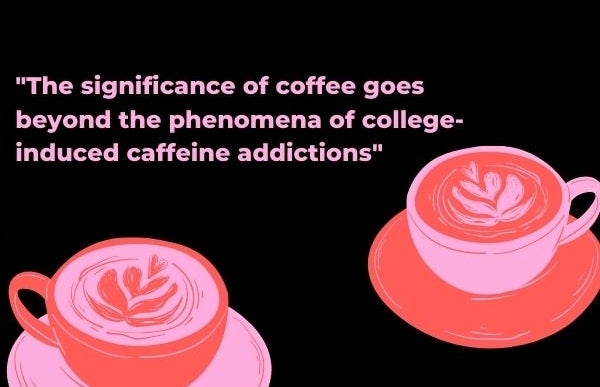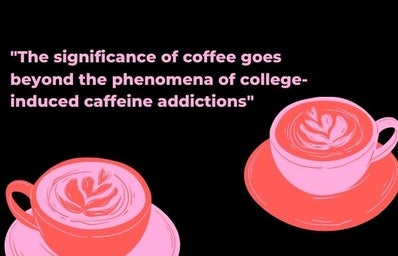Coffee has always made up a pretty significant part of my life, even before I started drinking coffee myself. I hail from a lengthy line of coffee drinkers. As a child, my mornings were greeted with a fresh pot. My mom, of course, would never adulterate the ‘crank oil’ she passes off as coffee with milk, sugar or any other flavoring. My Greek yiayia always kick starts her mornings with a coffee and her tsoureki, a traditional Greek sweet bread commonly had for breakfast. To me, the aroma of coffee beans is now both comforting and nostalgic. Aside from my near genetic taste for, and possible dependency on coffee, there is a deeply rich and fascinating history behind it that has generated the social and cultural significance as we know it today.
The significance of coffee goes beyond the phenomena of college-induced caffeine addictions, witty attire with even wittier caffeine-related hashtags and whatever is the most ‘happening’ extra ingredient to add to your coffee — be it collagen or coconut oil. Coffee is and has been a socio-economic and cultural pillar across the world that has bloomed beautiful long-standing traditions.
Coffee can be traced back to the ancient coffee forests in the Ethiopian plateau. The legend goes that, a goat herder, Kaldi, discovered the powerful properties of caffeine when his goats would not sleep through the night after they had eaten several berries off of the trees. Kaldi went on to share this with the abbot of the local monastery. Following the abbot’s revelation that the drink made from these berries allowed him to remain alert throughout the night, word quickly traveled.
Trade and coffee agriculture began on the Arabian Peninsula, and by the 15th and 16th centuries, the Yemeni district of Arabia, Persia, Egypt, Syria and Turkey were all cultivating coffee. People developed such an affinity for qahveh or khaneh in both the home and in public spaces, and it became central in all forms of socializing. Coffee-houses were so integral to the exchange of information and knowledge, and they were referred to as “Schools of the Wise.” Coffee was so deeply ingrained into the culture of the Ottoman Empire, women could actually divorce their husbands on the grounds of not being provided with sufficient coffee.
Having grown up in Turkey, the significance of coffee and how it is incorporated into Turkish culture has not waivered. There is a beautiful tradition of fortune-telling by reading the coffee grounds in the saucers that is also shared and practiced across cultures in the Middle East.
By the 17th century, coffee reached Europe. However, some were skeptical and believed it to be the work of the devil, so much so that papal approval from Pope Clement VIII was required. The approval was promptly given when he tried it for himself. Similar to the Middle East, coffee-houses became the epicenter for social activity, the exchange of knowledge, thought and stimulating conversations in major cities across Europe, such as in Austria, France and Germany.
While there are boundless reasons to love and appreciate coffee, the history and culture of coffee comes with a fair amount of shortcomings that should not be disregarded. Coffee, like several other agricultural products, was an avenue for primarily Western colonizers to enforce and enslave peoples to continue its cultivation for trade.
Coffee has served a significant part of daily life, the economy, progressive thought and social movement, culture and tradition across time and worldwide. It has been staining the likes of papers and white shirts — a sitch I know far too well — for centuries, and continues to be a staple of the world we know today. From the “whipped coffee” TikTok trend, which is literally just a Greek frappé, to the newest and most inventive way of brewing coffee, there is always something new and exciting coffee has to offer, thus keeping its place at the top of the hierarchy of beverages. Appreciating the present comes with a greater appreciation and understanding of the past. So, the next time you are on your morning coffee run, think about Kaldi and his goats.



